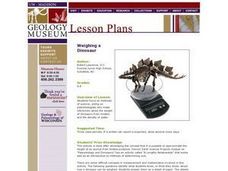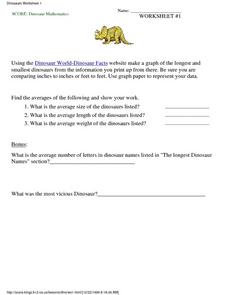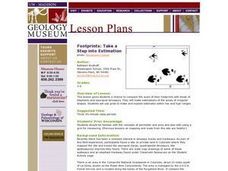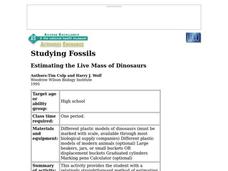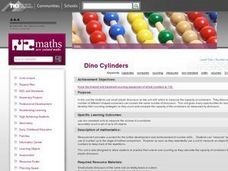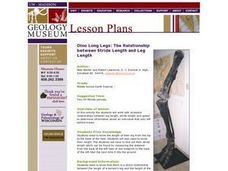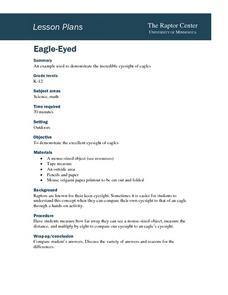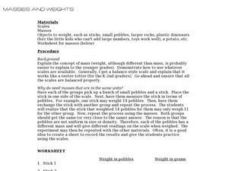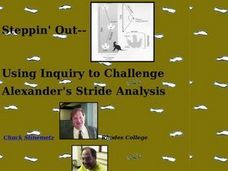Curated OER
Dinosaur Math
Second graders practice vocabulary related to measurement, mathematics, and dinosaurs. Using the engaging topic of dinosaurs, learners will calculate various information about dinosaurs and use measurement vocabulary. They will also...
Curated OER
Dinosaurs and Classification
Second graders explore dinosaurs and identify them by their size. They compare the dinosaurs with objects around the school or on the playground. Students predict which dinosaurs are the largest and then measure the length of dinosaurs.
Curated OER
When Dinosaurs Ruled the World
Students graph the varying sizes of dinosaurs. In this math and dinosaur lesson plan, students view dinosaur models and compare the different shapes and sizes of the dinosaurs. Students complete a dinosaur math activity, read...
Curated OER
Weighing a Dinosaur
Students role play as paleontologists who make inferences about the weight of dinosaurs. They use models and the density of water to make these inferences.
Curated OER
Dinosaur Mathematics
In this science and math worksheet, 5th graders answer four different questions related to dinosaurs. They graph the information with data located at a given website.
Curated OER
Footprints: Take a Step into Estimation
Compare sizes of student footprints with those of elephants and sauropod dinosaurs! Upper graders make estimations of the areas of irregular shapes; students use grids to make and explain estimates within low and high ranges.
Edinburgh UNESCO City of Literature Trust
The Lost World
Fans of Sherlock Holmes may be surprised to learn that in addition to stories of the famous deductionist, Sir Arthur Conan Doyle is also the creator of Professor Challenger. An irascible, unpredictable scientist, Challenger was featured...
Curated OER
Dinosaur Prints
Students examine dinosaur footprints and compare them to the shape of elephant footprints and to the size of their own footprints.
Curated OER
Extinction
Students explore reasons why the dinosaurs became extinct, and the specific needs (habitat, environment, food) of individual types of dinosaurs.
Curated OER
Make a Dinosaur
Students estimate the size of dinosaurs and create a dinosaur model. They create bar graphs of the sizes of dinosaurs one in meters and the other in "student" units. They draw a pictures and add words or sentences about their dinosaur.
Curated OER
Estimating the Live Mass of Dinosaurs
Learners calculate the volume of scale model dinosaurs using a water displacement method. They use formulas to calculate the live mass each of the species of dinosaur. Then they complete and discuss a series of questions.
Curated OER
Estimating the Live Mass of Dinosaurs
Students estimate the live mass of dinosaurs. Using dinosaur and modern animal models, students use simple displacement methods to calculate the volume of the models. They calculate the masses of each model. Students compare the...
Curated OER
Dino Hunt
Young scholars use the Internet to gather information about dinosaurs. They practice navagating through the different websites. They also practice listening to directions and also explore how to fill out a KWL chart.
Curated OER
Estimation
Third graders gain an understanding of estimation as an educated guess. They explore measuring and how looking at various object size and shape can help form ones guess towards estimation. They use dinosaurs for an estimation activity.
Curated OER
MUD-A Walk
Students investigate their tracks to determine the number of footsteps it takes to travel the entire length of their bodies. Then they determine the taller of two children and the shorter of two children with their tracks. Students also...
Curated OER
Measurement and the Illampi Mound Colony
Pupils comprehend the basic units of measurement, scale, plotting, and basic grids. Students practice their estimation
and measuring skills and will demonstrate their ability to work well in groups.
Curated OER
Big Foot
Students measure the length of their feet and shoes using nonstandard measurements. They check their estimates and record theirmeasurements on a paper.
Curated OER
Dino Cylinders
Students investigate the capacity of containers using small dinosaur figures as the unit of measure. They work with a number of different shaped containers to compare the capacity as they practice counting the dinosaurs. They complete an...
Curated OER
History of Our Solar System Time Line
Ninth graders explore the concept of ratios. In this ratio instructional activity, 9th graders construct a to scale time line that starts at the beginning of time. Students determine the correct placement of big events in time such as...
Curated OER
Dino Long Legs
Students calculate the stride length of a walking or running animal. They use scale models of dinosaurs to calculate the leg and stride length of the animals.
Curated OER
Science: The Age of the Redwoods
Students discover how to estimate the age of redwood trees. They measure the trees' diameters by using string to calculate the circumferences. Students conclude by discussing the science of dendrochronolgy.
Curated OER
Eagle-Eyed
Students study the eyesight of eagles. They discuss raptors and their eyesight and compare it to their own. They measure how far away they can see a small object and its distance. They calculate the eyesight to measure an eagle's...
Curated OER
Masses and Weights
Students explore the concept of weight and mass and the importance of units. Using a balance, they determine the weight of various objects in the unit of "pebbles" and in grams.
Curated OER
Steppin' Out: Using Inquiry to Challente Alexander's Stride Analysis
Learners distinguish between walking, jogging and running trackways in humans. They analyze the phylogenetic progression of the leg position as described by pace width and angulation, comparing amphibians, reptiles and mammals. Research...





